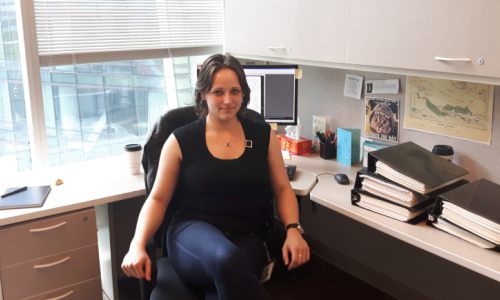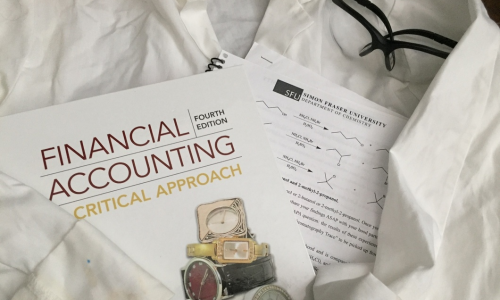
Last night, Simon Fraser University at Surrey hosted a very successful open house, in recognition of its 10th anniversary as an SFU campus. It was fun evening - lots of prospective students, parents, various members of the community - all stopped by to join in the celebrations.
Our office (myself and some wonderful colleagues from co-operative education) had the opportunity to do something rather unique - we got our hands on an interactive art installation put together by a group called the GenWHY Media Project, called "workLIFE." The piece is constructed out of four solid re-purposed doors, bolted together and painted with chalkboard paint. Passers by are encouraged to write on the doors - one side denoting life and the other denoting work - to add their thoughts in response to the statements "work is..." and "life is..." It's a clever piece of art that "crowd sources meaning" and brings the issue of work/life transition into a physical, visual realm.
While we could only display one side of the piece in our relatively small office, we found that people were eager to share their thoughts about work on the board (give people a place to doodle, and they'll doodle happily).
Blank slate
In my roughly hour-long commute to work this morning, I was pondering - as I usually do - what to write about today. Thinking back on last night, it suddenly seemed obvious that a post about "what work means" would be both timely and appropriate.
We had a few themes pop up last night, among them:
-
Work is interesting
-
Work is fun
-
Work is boring
-
Work is a necessary evil
-
Work is something you should love
So what does work really mean?
The late psychologist Alfred Adler called work one of the three basic "tasks of life," along with love, and friendship. By succeeding in these three areas of life, he argued that people would be fundamentally healthy. Conversely, if we fall short in one or more of these tasks, we won't be fulfilled.
So, Adler was essentially saying that work makes up a third of what's important in life. I think that's a reasonable assertion - we spend a lot of time working, probably more than any other single activity. It's a mistake, though, to draw a straight line from time spent doing something to its level of importance. We often spend a lot of time doing things that aren't that important in the grand scheme of things. Similarly, we may spend precious little time on activities we consider to be very important, and that may be enough. So, even if we spend 80% of our time working, it's still only 33% of what's important for the average person.
It's also worth noting that "work" and "career" are not necessarily the same construct. If work is 33% of what's important in life, how much of a career is comprised of work? Mention the word "career" to someone, and they will probably think of "work" - whatever it is they do that allows them to pay the bills. There's more to a career than that, though. So what's an appropriate number to describe how much of a career is work? 50%? 66%? 80%?
While we're at it, how much if what's important in life can be attributed to a career?
I don't know.
But I think these are helpful questions to think about.
What is work to you? Leave your thoughts in the comments, or @ me on twitter.
















